Leadership and Operational Management Analysis of Waitrose
VerifiedAdded on 2024/05/30
|21
|4665
|194
Report
AI Summary
This report provides a detailed analysis of leadership and management within Waitrose, a leading retail supermarket chain. It defines and compares the roles and characteristics of leaders and managers, highlighting the differences between leadership and management functions. Various situations within Waitrose are examined to illustrate the application of management functions and leadership roles. The report explores different theories and models, including situational leadership, systems leadership, and contingency theory, to assess their impact on growth and sustainable performance. It also explains key approaches to operations management and the role that leaders and managers play in functional areas, emphasizing the importance of operations management in achieving business objectives. Finally, the report assesses the factors within the business environment that impact operational management and decision-making by leaders and managers, concluding with suggestions for further improvements.
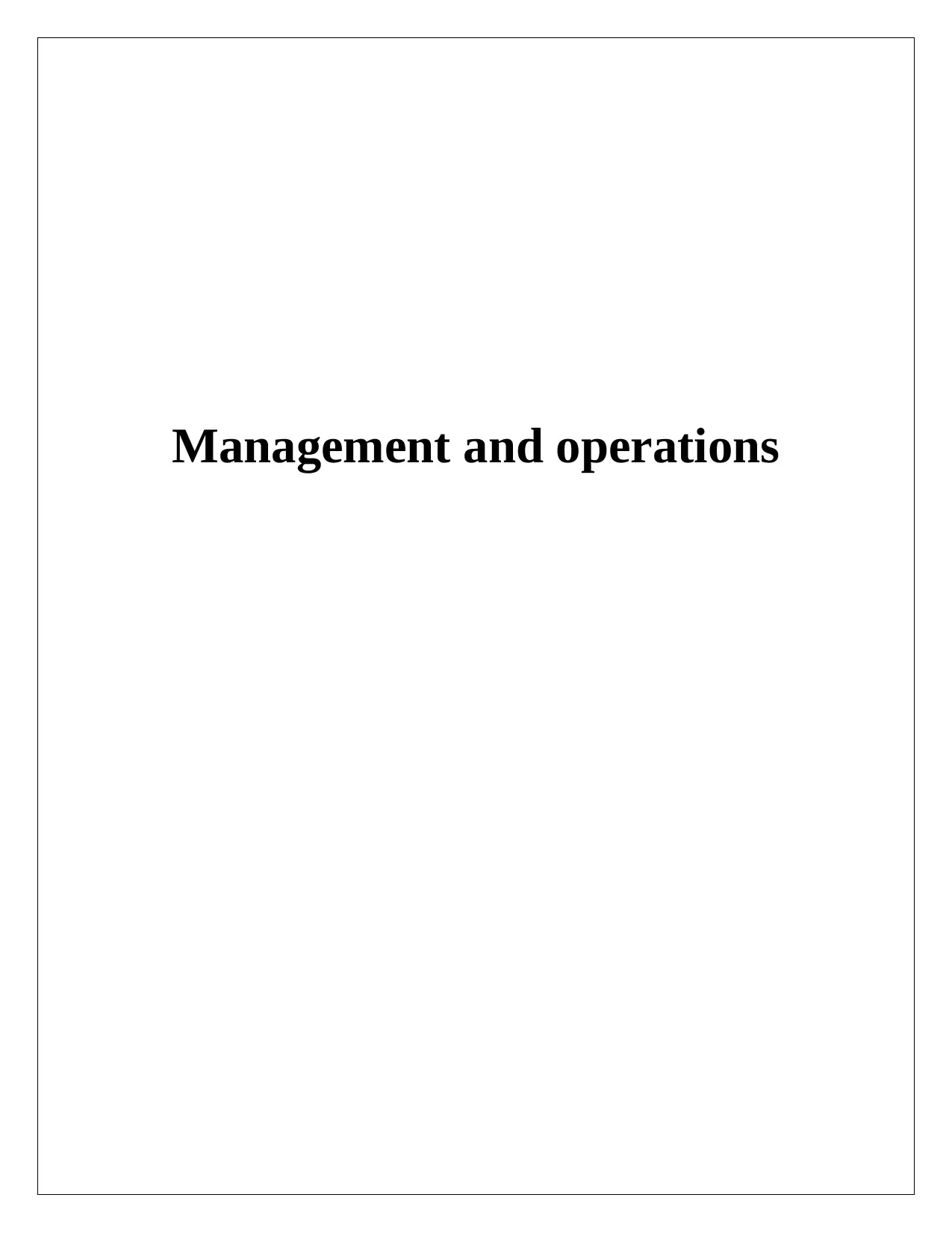
Management and operations
Paraphrase This Document
Need a fresh take? Get an instant paraphrase of this document with our AI Paraphraser
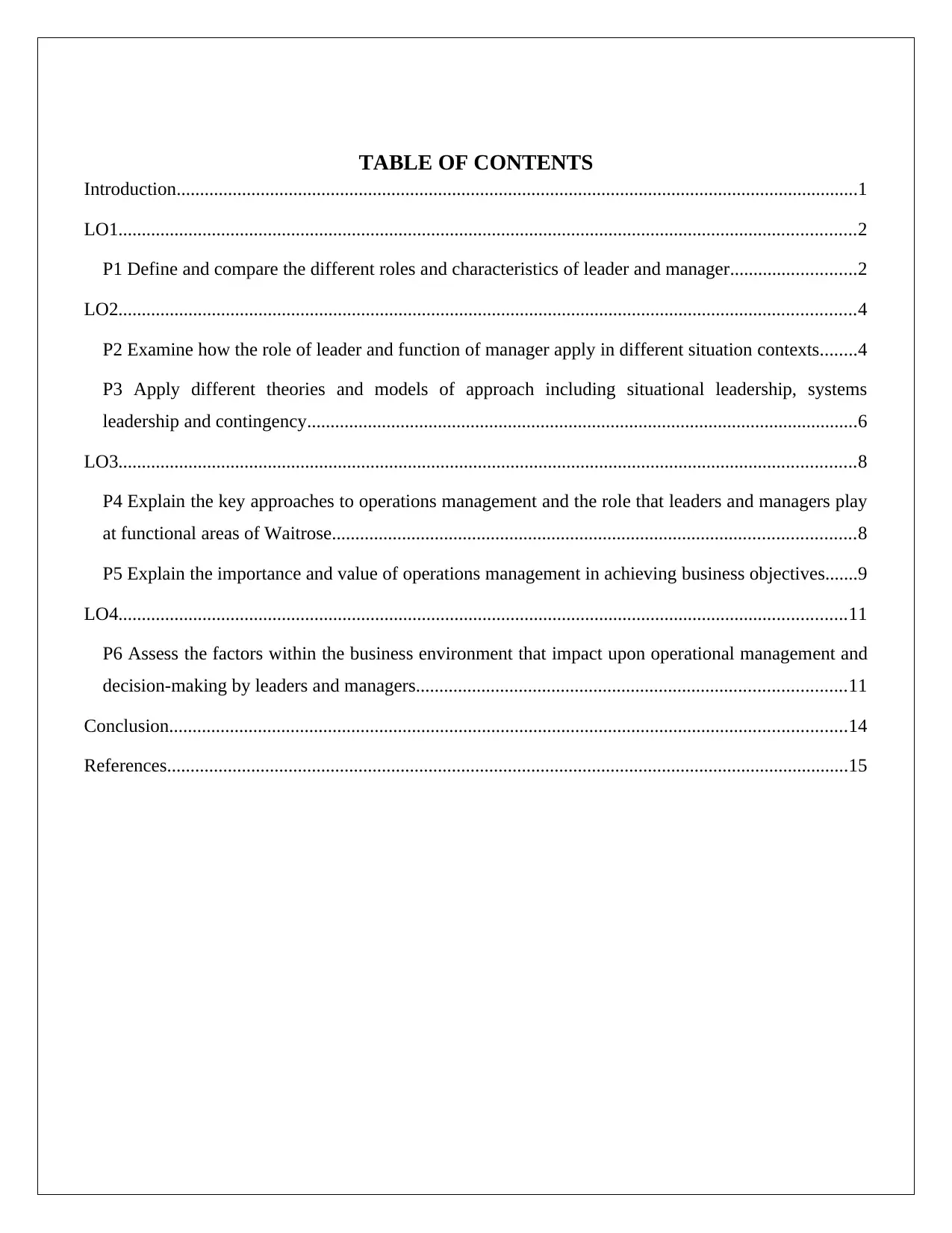
TABLE OF CONTENTS
Introduction..................................................................................................................................................1
LO1..............................................................................................................................................................2
P1 Define and compare the different roles and characteristics of leader and manager...........................2
LO2..............................................................................................................................................................4
P2 Examine how the role of leader and function of manager apply in different situation contexts........4
P3 Apply different theories and models of approach including situational leadership, systems
leadership and contingency......................................................................................................................6
LO3..............................................................................................................................................................8
P4 Explain the key approaches to operations management and the role that leaders and managers play
at functional areas of Waitrose................................................................................................................8
P5 Explain the importance and value of operations management in achieving business objectives.......9
LO4............................................................................................................................................................11
P6 Assess the factors within the business environment that impact upon operational management and
decision-making by leaders and managers............................................................................................11
Conclusion.................................................................................................................................................14
References..................................................................................................................................................15
Introduction..................................................................................................................................................1
LO1..............................................................................................................................................................2
P1 Define and compare the different roles and characteristics of leader and manager...........................2
LO2..............................................................................................................................................................4
P2 Examine how the role of leader and function of manager apply in different situation contexts........4
P3 Apply different theories and models of approach including situational leadership, systems
leadership and contingency......................................................................................................................6
LO3..............................................................................................................................................................8
P4 Explain the key approaches to operations management and the role that leaders and managers play
at functional areas of Waitrose................................................................................................................8
P5 Explain the importance and value of operations management in achieving business objectives.......9
LO4............................................................................................................................................................11
P6 Assess the factors within the business environment that impact upon operational management and
decision-making by leaders and managers............................................................................................11
Conclusion.................................................................................................................................................14
References..................................................................................................................................................15
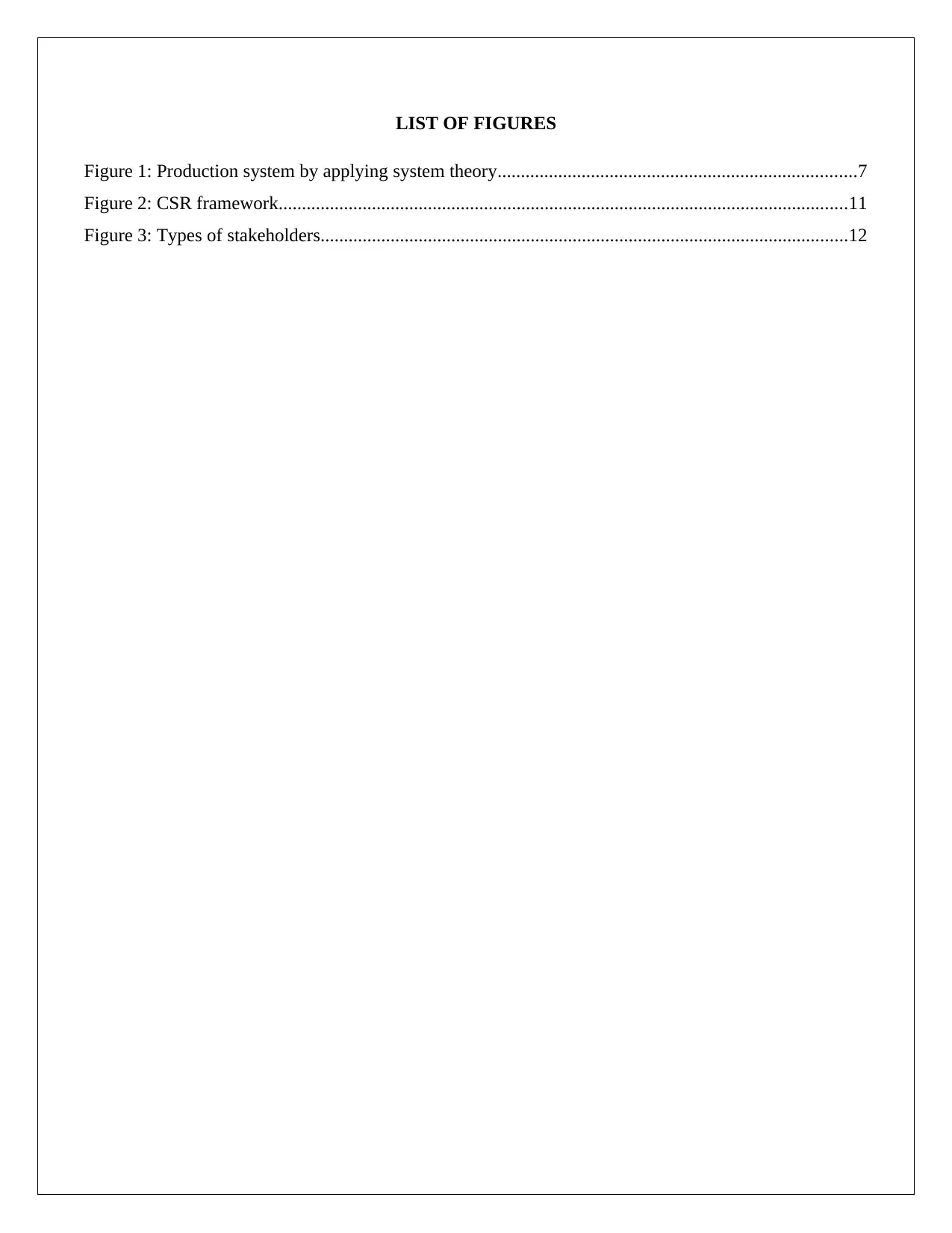
LIST OF FIGURES
Figure 1: Production system by applying system theory.............................................................................7
Figure 2: CSR framework..........................................................................................................................11
Figure 3: Types of stakeholders.................................................................................................................12
Figure 1: Production system by applying system theory.............................................................................7
Figure 2: CSR framework..........................................................................................................................11
Figure 3: Types of stakeholders.................................................................................................................12
⊘ This is a preview!⊘
Do you want full access?
Subscribe today to unlock all pages.

Trusted by 1+ million students worldwide
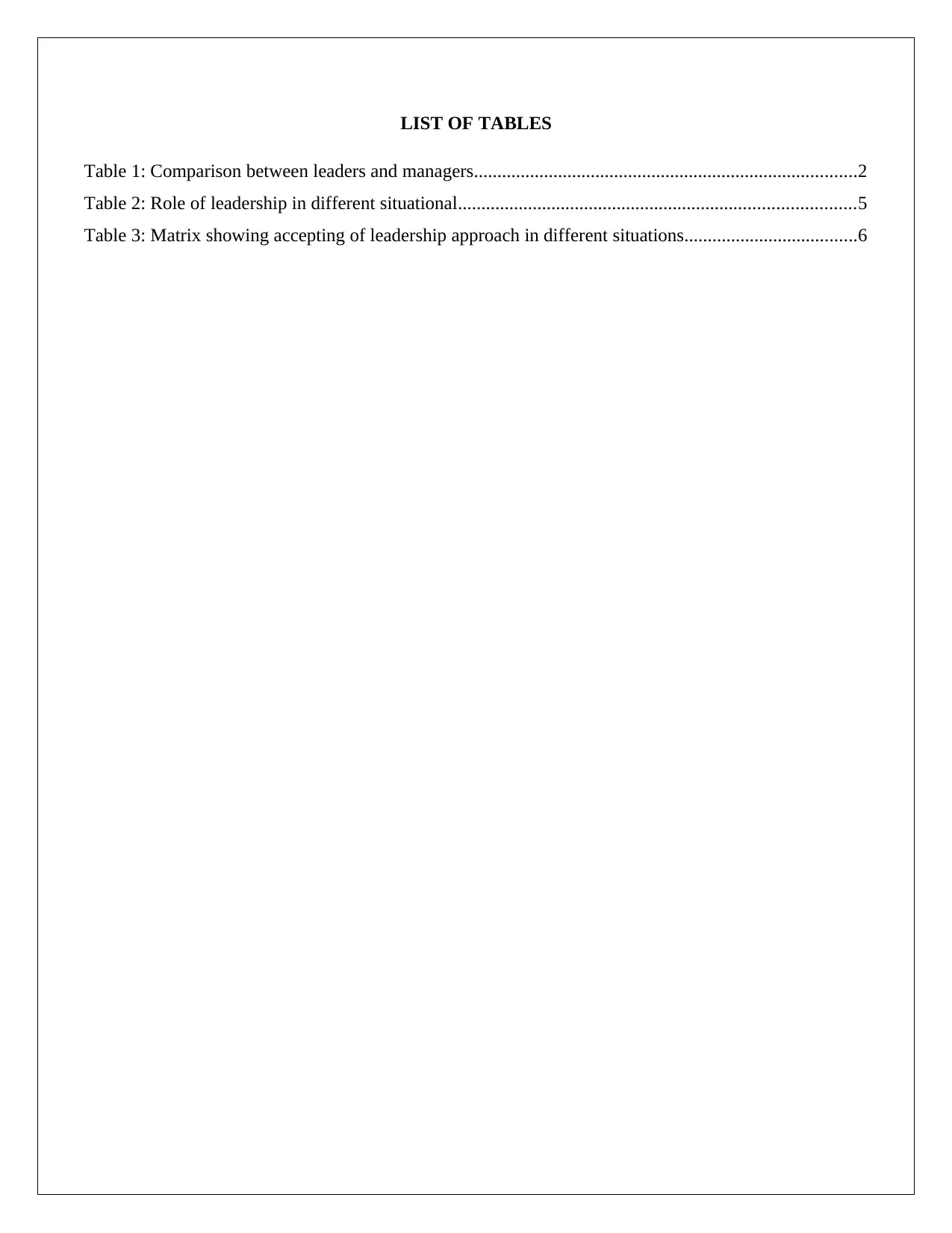
LIST OF TABLES
Table 1: Comparison between leaders and managers..................................................................................2
Table 2: Role of leadership in different situational.....................................................................................5
Table 3: Matrix showing accepting of leadership approach in different situations.....................................6
Table 1: Comparison between leaders and managers..................................................................................2
Table 2: Role of leadership in different situational.....................................................................................5
Table 3: Matrix showing accepting of leadership approach in different situations.....................................6
Paraphrase This Document
Need a fresh take? Get an instant paraphrase of this document with our AI Paraphraser
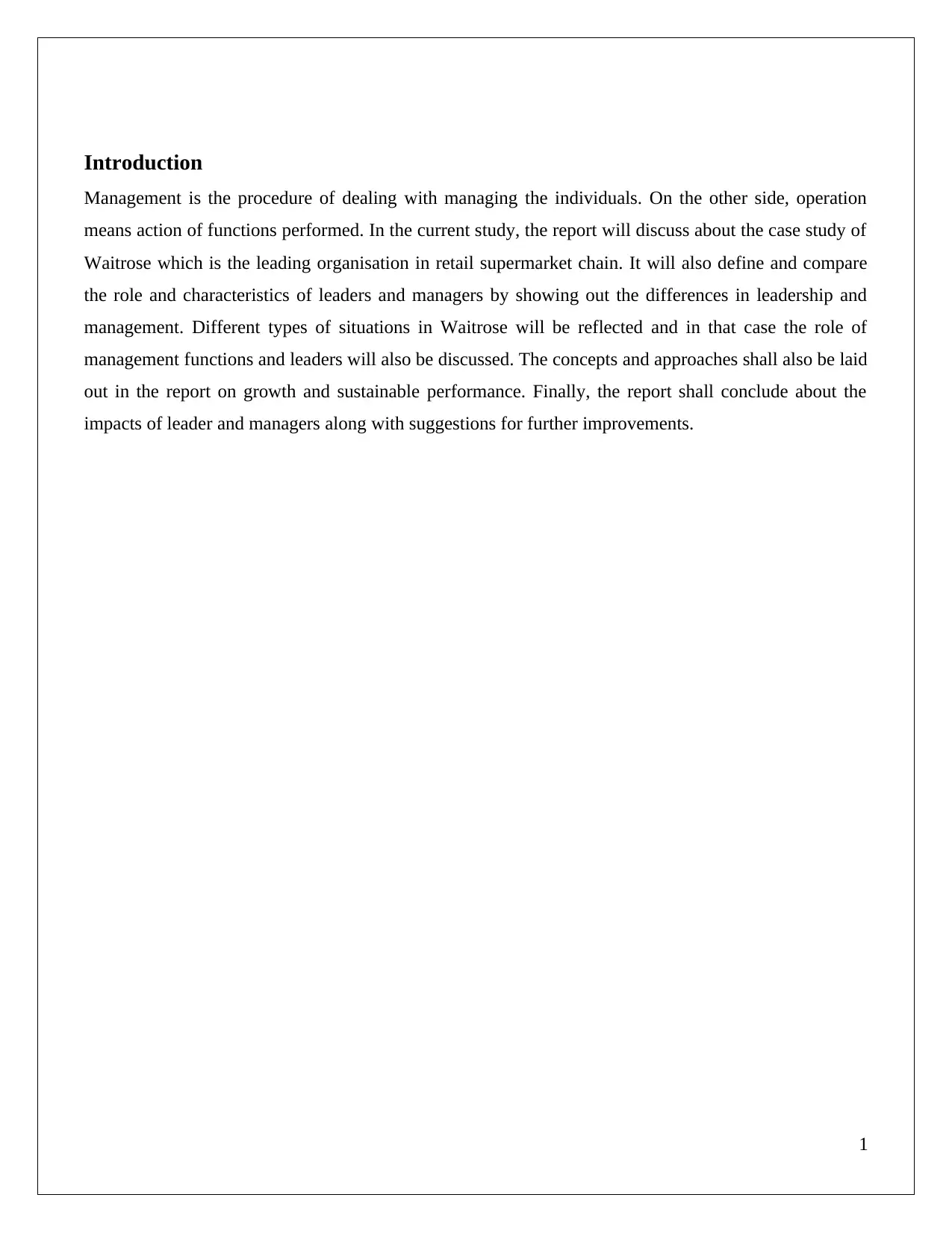
Introduction
Management is the procedure of dealing with managing the individuals. On the other side, operation
means action of functions performed. In the current study, the report will discuss about the case study of
Waitrose which is the leading organisation in retail supermarket chain. It will also define and compare
the role and characteristics of leaders and managers by showing out the differences in leadership and
management. Different types of situations in Waitrose will be reflected and in that case the role of
management functions and leaders will also be discussed. The concepts and approaches shall also be laid
out in the report on growth and sustainable performance. Finally, the report shall conclude about the
impacts of leader and managers along with suggestions for further improvements.
1
Management is the procedure of dealing with managing the individuals. On the other side, operation
means action of functions performed. In the current study, the report will discuss about the case study of
Waitrose which is the leading organisation in retail supermarket chain. It will also define and compare
the role and characteristics of leaders and managers by showing out the differences in leadership and
management. Different types of situations in Waitrose will be reflected and in that case the role of
management functions and leaders will also be discussed. The concepts and approaches shall also be laid
out in the report on growth and sustainable performance. Finally, the report shall conclude about the
impacts of leader and managers along with suggestions for further improvements.
1
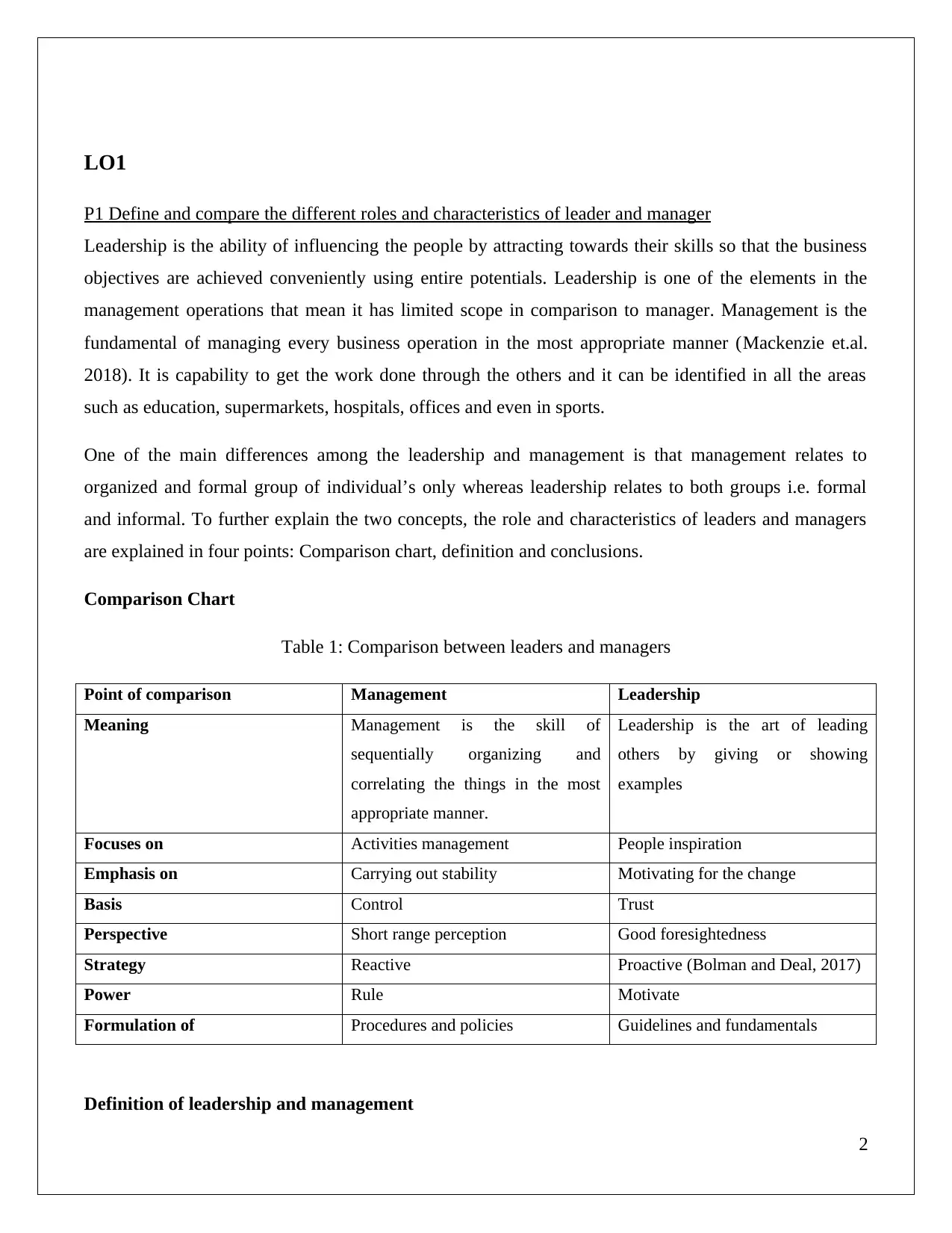
LO1
P1 Define and compare the different roles and characteristics of leader and manager
Leadership is the ability of influencing the people by attracting towards their skills so that the business
objectives are achieved conveniently using entire potentials. Leadership is one of the elements in the
management operations that mean it has limited scope in comparison to manager. Management is the
fundamental of managing every business operation in the most appropriate manner (Mackenzie et.al.
2018). It is capability to get the work done through the others and it can be identified in all the areas
such as education, supermarkets, hospitals, offices and even in sports.
One of the main differences among the leadership and management is that management relates to
organized and formal group of individual’s only whereas leadership relates to both groups i.e. formal
and informal. To further explain the two concepts, the role and characteristics of leaders and managers
are explained in four points: Comparison chart, definition and conclusions.
Comparison Chart
Table 1: Comparison between leaders and managers
Point of comparison Management Leadership
Meaning Management is the skill of
sequentially organizing and
correlating the things in the most
appropriate manner.
Leadership is the art of leading
others by giving or showing
examples
Focuses on Activities management People inspiration
Emphasis on Carrying out stability Motivating for the change
Basis Control Trust
Perspective Short range perception Good foresightedness
Strategy Reactive Proactive (Bolman and Deal, 2017)
Power Rule Motivate
Formulation of Procedures and policies Guidelines and fundamentals
Definition of leadership and management
2
P1 Define and compare the different roles and characteristics of leader and manager
Leadership is the ability of influencing the people by attracting towards their skills so that the business
objectives are achieved conveniently using entire potentials. Leadership is one of the elements in the
management operations that mean it has limited scope in comparison to manager. Management is the
fundamental of managing every business operation in the most appropriate manner (Mackenzie et.al.
2018). It is capability to get the work done through the others and it can be identified in all the areas
such as education, supermarkets, hospitals, offices and even in sports.
One of the main differences among the leadership and management is that management relates to
organized and formal group of individual’s only whereas leadership relates to both groups i.e. formal
and informal. To further explain the two concepts, the role and characteristics of leaders and managers
are explained in four points: Comparison chart, definition and conclusions.
Comparison Chart
Table 1: Comparison between leaders and managers
Point of comparison Management Leadership
Meaning Management is the skill of
sequentially organizing and
correlating the things in the most
appropriate manner.
Leadership is the art of leading
others by giving or showing
examples
Focuses on Activities management People inspiration
Emphasis on Carrying out stability Motivating for the change
Basis Control Trust
Perspective Short range perception Good foresightedness
Strategy Reactive Proactive (Bolman and Deal, 2017)
Power Rule Motivate
Formulation of Procedures and policies Guidelines and fundamentals
Definition of leadership and management
2
⊘ This is a preview!⊘
Do you want full access?
Subscribe today to unlock all pages.

Trusted by 1+ million students worldwide
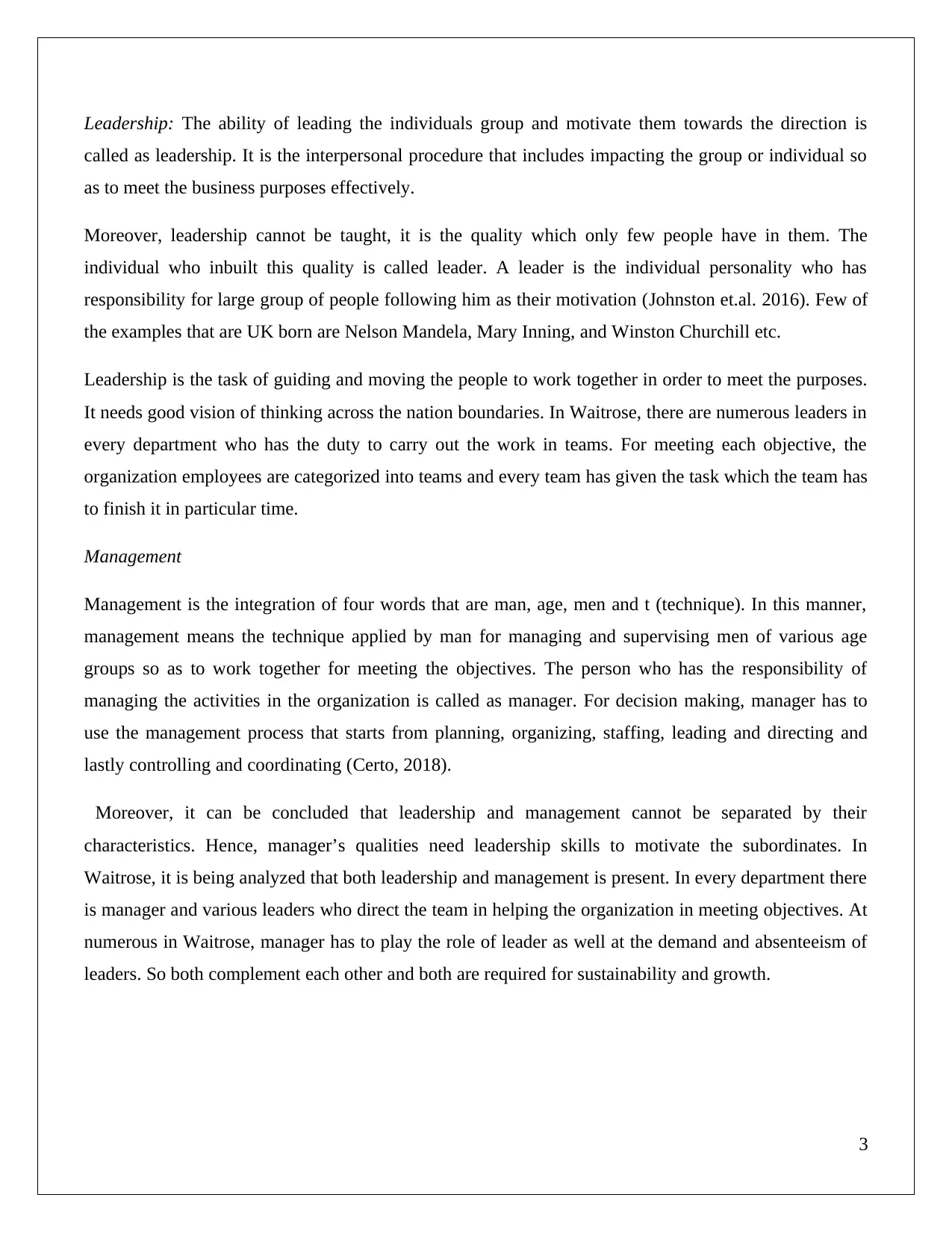
Leadership: The ability of leading the individuals group and motivate them towards the direction is
called as leadership. It is the interpersonal procedure that includes impacting the group or individual so
as to meet the business purposes effectively.
Moreover, leadership cannot be taught, it is the quality which only few people have in them. The
individual who inbuilt this quality is called leader. A leader is the individual personality who has
responsibility for large group of people following him as their motivation (Johnston et.al. 2016). Few of
the examples that are UK born are Nelson Mandela, Mary Inning, and Winston Churchill etc.
Leadership is the task of guiding and moving the people to work together in order to meet the purposes.
It needs good vision of thinking across the nation boundaries. In Waitrose, there are numerous leaders in
every department who has the duty to carry out the work in teams. For meeting each objective, the
organization employees are categorized into teams and every team has given the task which the team has
to finish it in particular time.
Management
Management is the integration of four words that are man, age, men and t (technique). In this manner,
management means the technique applied by man for managing and supervising men of various age
groups so as to work together for meeting the objectives. The person who has the responsibility of
managing the activities in the organization is called as manager. For decision making, manager has to
use the management process that starts from planning, organizing, staffing, leading and directing and
lastly controlling and coordinating (Certo, 2018).
Moreover, it can be concluded that leadership and management cannot be separated by their
characteristics. Hence, manager’s qualities need leadership skills to motivate the subordinates. In
Waitrose, it is being analyzed that both leadership and management is present. In every department there
is manager and various leaders who direct the team in helping the organization in meeting objectives. At
numerous in Waitrose, manager has to play the role of leader as well at the demand and absenteeism of
leaders. So both complement each other and both are required for sustainability and growth.
3
called as leadership. It is the interpersonal procedure that includes impacting the group or individual so
as to meet the business purposes effectively.
Moreover, leadership cannot be taught, it is the quality which only few people have in them. The
individual who inbuilt this quality is called leader. A leader is the individual personality who has
responsibility for large group of people following him as their motivation (Johnston et.al. 2016). Few of
the examples that are UK born are Nelson Mandela, Mary Inning, and Winston Churchill etc.
Leadership is the task of guiding and moving the people to work together in order to meet the purposes.
It needs good vision of thinking across the nation boundaries. In Waitrose, there are numerous leaders in
every department who has the duty to carry out the work in teams. For meeting each objective, the
organization employees are categorized into teams and every team has given the task which the team has
to finish it in particular time.
Management
Management is the integration of four words that are man, age, men and t (technique). In this manner,
management means the technique applied by man for managing and supervising men of various age
groups so as to work together for meeting the objectives. The person who has the responsibility of
managing the activities in the organization is called as manager. For decision making, manager has to
use the management process that starts from planning, organizing, staffing, leading and directing and
lastly controlling and coordinating (Certo, 2018).
Moreover, it can be concluded that leadership and management cannot be separated by their
characteristics. Hence, manager’s qualities need leadership skills to motivate the subordinates. In
Waitrose, it is being analyzed that both leadership and management is present. In every department there
is manager and various leaders who direct the team in helping the organization in meeting objectives. At
numerous in Waitrose, manager has to play the role of leader as well at the demand and absenteeism of
leaders. So both complement each other and both are required for sustainability and growth.
3
Paraphrase This Document
Need a fresh take? Get an instant paraphrase of this document with our AI Paraphraser
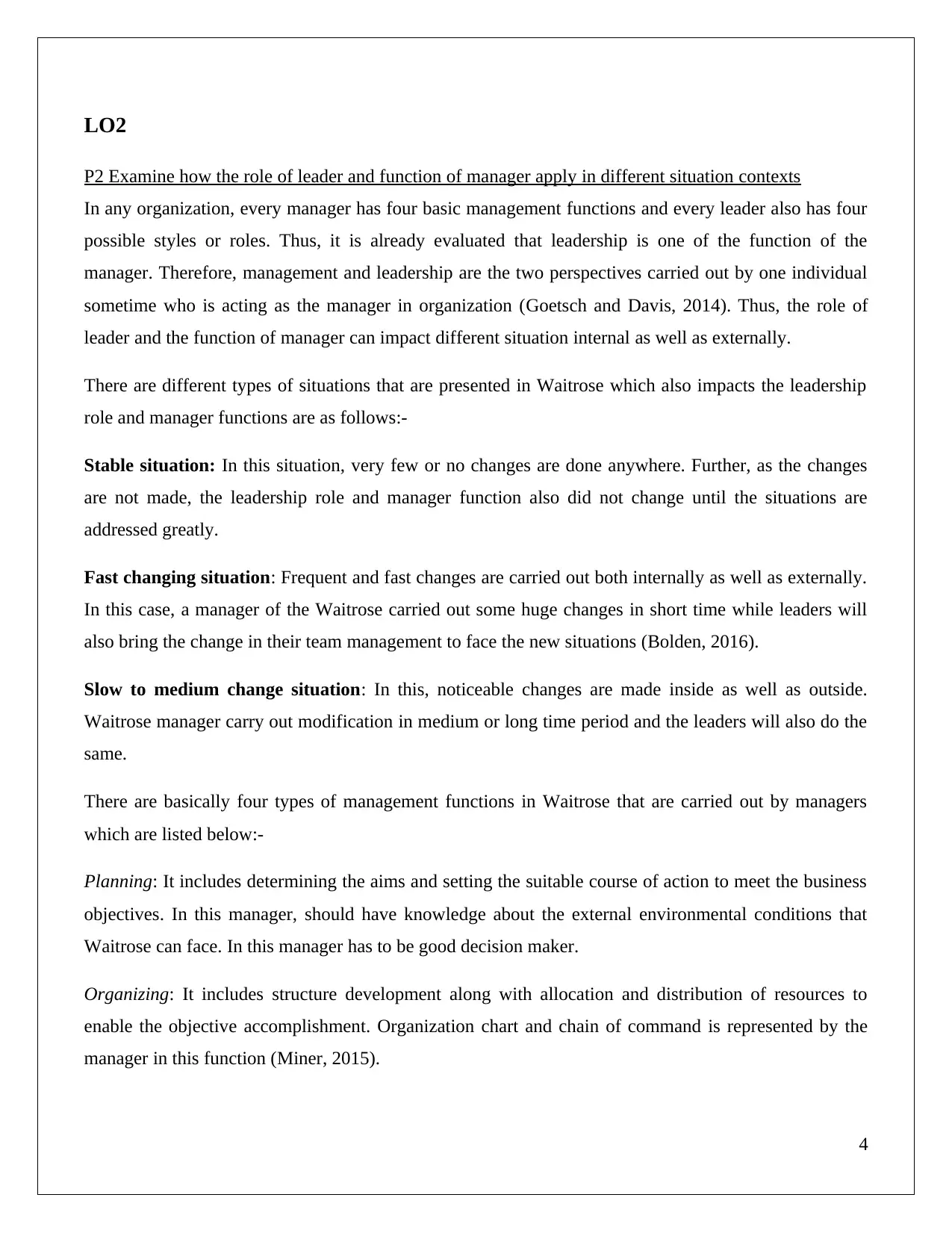
LO2
P2 Examine how the role of leader and function of manager apply in different situation contexts
In any organization, every manager has four basic management functions and every leader also has four
possible styles or roles. Thus, it is already evaluated that leadership is one of the function of the
manager. Therefore, management and leadership are the two perspectives carried out by one individual
sometime who is acting as the manager in organization (Goetsch and Davis, 2014). Thus, the role of
leader and the function of manager can impact different situation internal as well as externally.
There are different types of situations that are presented in Waitrose which also impacts the leadership
role and manager functions are as follows:-
Stable situation: In this situation, very few or no changes are done anywhere. Further, as the changes
are not made, the leadership role and manager function also did not change until the situations are
addressed greatly.
Fast changing situation: Frequent and fast changes are carried out both internally as well as externally.
In this case, a manager of the Waitrose carried out some huge changes in short time while leaders will
also bring the change in their team management to face the new situations (Bolden, 2016).
Slow to medium change situation: In this, noticeable changes are made inside as well as outside.
Waitrose manager carry out modification in medium or long time period and the leaders will also do the
same.
There are basically four types of management functions in Waitrose that are carried out by managers
which are listed below:-
Planning: It includes determining the aims and setting the suitable course of action to meet the business
objectives. In this manager, should have knowledge about the external environmental conditions that
Waitrose can face. In this manager has to be good decision maker.
Organizing: It includes structure development along with allocation and distribution of resources to
enable the objective accomplishment. Organization chart and chain of command is represented by the
manager in this function (Miner, 2015).
4
P2 Examine how the role of leader and function of manager apply in different situation contexts
In any organization, every manager has four basic management functions and every leader also has four
possible styles or roles. Thus, it is already evaluated that leadership is one of the function of the
manager. Therefore, management and leadership are the two perspectives carried out by one individual
sometime who is acting as the manager in organization (Goetsch and Davis, 2014). Thus, the role of
leader and the function of manager can impact different situation internal as well as externally.
There are different types of situations that are presented in Waitrose which also impacts the leadership
role and manager functions are as follows:-
Stable situation: In this situation, very few or no changes are done anywhere. Further, as the changes
are not made, the leadership role and manager function also did not change until the situations are
addressed greatly.
Fast changing situation: Frequent and fast changes are carried out both internally as well as externally.
In this case, a manager of the Waitrose carried out some huge changes in short time while leaders will
also bring the change in their team management to face the new situations (Bolden, 2016).
Slow to medium change situation: In this, noticeable changes are made inside as well as outside.
Waitrose manager carry out modification in medium or long time period and the leaders will also do the
same.
There are basically four types of management functions in Waitrose that are carried out by managers
which are listed below:-
Planning: It includes determining the aims and setting the suitable course of action to meet the business
objectives. In this manager, should have knowledge about the external environmental conditions that
Waitrose can face. In this manager has to be good decision maker.
Organizing: It includes structure development along with allocation and distribution of resources to
enable the objective accomplishment. Organization chart and chain of command is represented by the
manager in this function (Miner, 2015).
4
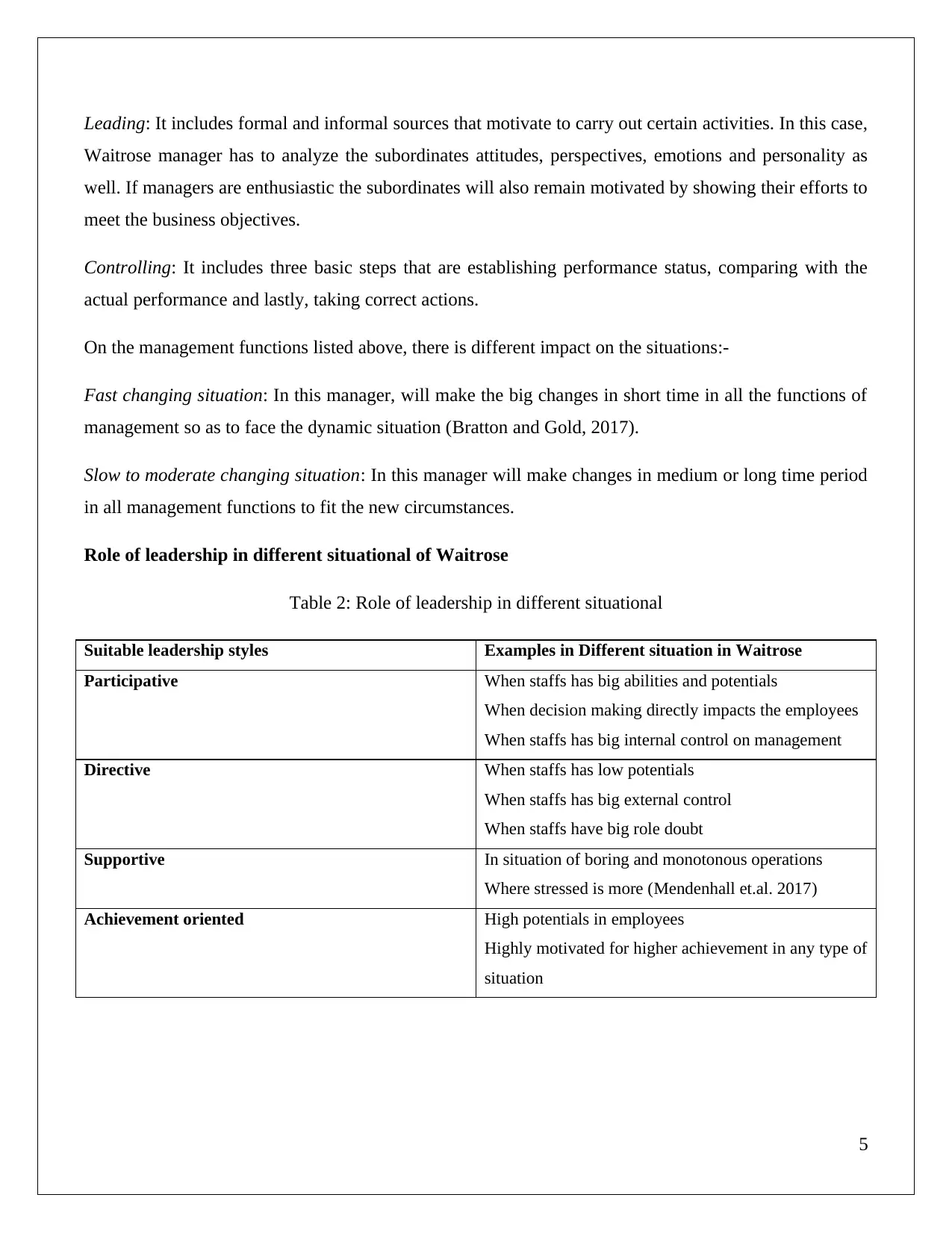
Leading: It includes formal and informal sources that motivate to carry out certain activities. In this case,
Waitrose manager has to analyze the subordinates attitudes, perspectives, emotions and personality as
well. If managers are enthusiastic the subordinates will also remain motivated by showing their efforts to
meet the business objectives.
Controlling: It includes three basic steps that are establishing performance status, comparing with the
actual performance and lastly, taking correct actions.
On the management functions listed above, there is different impact on the situations:-
Fast changing situation: In this manager, will make the big changes in short time in all the functions of
management so as to face the dynamic situation (Bratton and Gold, 2017).
Slow to moderate changing situation: In this manager will make changes in medium or long time period
in all management functions to fit the new circumstances.
Role of leadership in different situational of Waitrose
Table 2: Role of leadership in different situational
Suitable leadership styles Examples in Different situation in Waitrose
Participative When staffs has big abilities and potentials
When decision making directly impacts the employees
When staffs has big internal control on management
Directive When staffs has low potentials
When staffs has big external control
When staffs have big role doubt
Supportive In situation of boring and monotonous operations
Where stressed is more (Mendenhall et.al. 2017)
Achievement oriented High potentials in employees
Highly motivated for higher achievement in any type of
situation
5
Waitrose manager has to analyze the subordinates attitudes, perspectives, emotions and personality as
well. If managers are enthusiastic the subordinates will also remain motivated by showing their efforts to
meet the business objectives.
Controlling: It includes three basic steps that are establishing performance status, comparing with the
actual performance and lastly, taking correct actions.
On the management functions listed above, there is different impact on the situations:-
Fast changing situation: In this manager, will make the big changes in short time in all the functions of
management so as to face the dynamic situation (Bratton and Gold, 2017).
Slow to moderate changing situation: In this manager will make changes in medium or long time period
in all management functions to fit the new circumstances.
Role of leadership in different situational of Waitrose
Table 2: Role of leadership in different situational
Suitable leadership styles Examples in Different situation in Waitrose
Participative When staffs has big abilities and potentials
When decision making directly impacts the employees
When staffs has big internal control on management
Directive When staffs has low potentials
When staffs has big external control
When staffs have big role doubt
Supportive In situation of boring and monotonous operations
Where stressed is more (Mendenhall et.al. 2017)
Achievement oriented High potentials in employees
Highly motivated for higher achievement in any type of
situation
5
⊘ This is a preview!⊘
Do you want full access?
Subscribe today to unlock all pages.

Trusted by 1+ million students worldwide
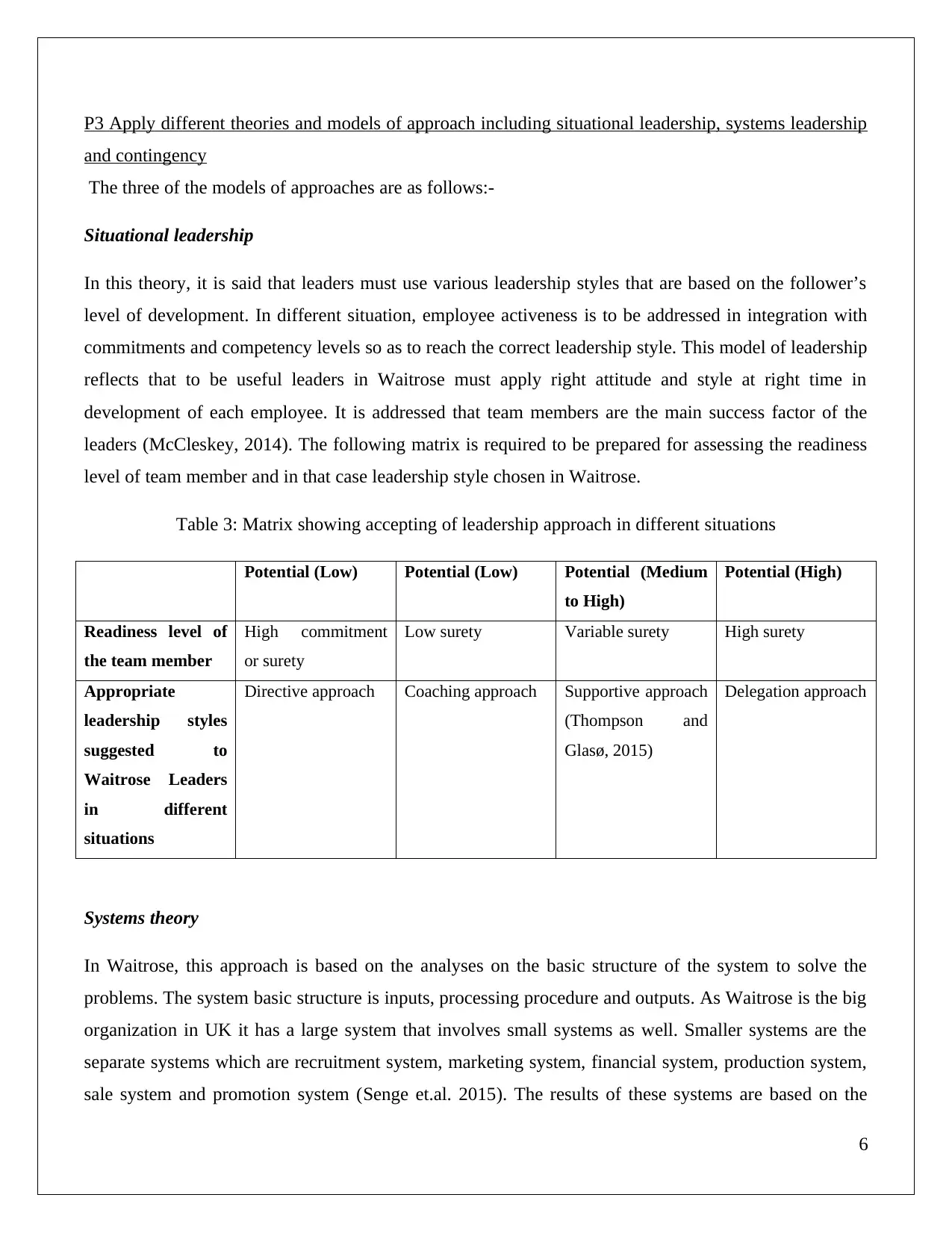
P3 Apply different theories and models of approach including situational leadership, systems leadership
and contingency
The three of the models of approaches are as follows:-
Situational leadership
In this theory, it is said that leaders must use various leadership styles that are based on the follower’s
level of development. In different situation, employee activeness is to be addressed in integration with
commitments and competency levels so as to reach the correct leadership style. This model of leadership
reflects that to be useful leaders in Waitrose must apply right attitude and style at right time in
development of each employee. It is addressed that team members are the main success factor of the
leaders (McCleskey, 2014). The following matrix is required to be prepared for assessing the readiness
level of team member and in that case leadership style chosen in Waitrose.
Table 3: Matrix showing accepting of leadership approach in different situations
Potential (Low) Potential (Low) Potential (Medium
to High)
Potential (High)
Readiness level of
the team member
High commitment
or surety
Low surety Variable surety High surety
Appropriate
leadership styles
suggested to
Waitrose Leaders
in different
situations
Directive approach Coaching approach Supportive approach
(Thompson and
Glasø, 2015)
Delegation approach
Systems theory
In Waitrose, this approach is based on the analyses on the basic structure of the system to solve the
problems. The system basic structure is inputs, processing procedure and outputs. As Waitrose is the big
organization in UK it has a large system that involves small systems as well. Smaller systems are the
separate systems which are recruitment system, marketing system, financial system, production system,
sale system and promotion system (Senge et.al. 2015). The results of these systems are based on the
6
and contingency
The three of the models of approaches are as follows:-
Situational leadership
In this theory, it is said that leaders must use various leadership styles that are based on the follower’s
level of development. In different situation, employee activeness is to be addressed in integration with
commitments and competency levels so as to reach the correct leadership style. This model of leadership
reflects that to be useful leaders in Waitrose must apply right attitude and style at right time in
development of each employee. It is addressed that team members are the main success factor of the
leaders (McCleskey, 2014). The following matrix is required to be prepared for assessing the readiness
level of team member and in that case leadership style chosen in Waitrose.
Table 3: Matrix showing accepting of leadership approach in different situations
Potential (Low) Potential (Low) Potential (Medium
to High)
Potential (High)
Readiness level of
the team member
High commitment
or surety
Low surety Variable surety High surety
Appropriate
leadership styles
suggested to
Waitrose Leaders
in different
situations
Directive approach Coaching approach Supportive approach
(Thompson and
Glasø, 2015)
Delegation approach
Systems theory
In Waitrose, this approach is based on the analyses on the basic structure of the system to solve the
problems. The system basic structure is inputs, processing procedure and outputs. As Waitrose is the big
organization in UK it has a large system that involves small systems as well. Smaller systems are the
separate systems which are recruitment system, marketing system, financial system, production system,
sale system and promotion system (Senge et.al. 2015). The results of these systems are based on the
6
Paraphrase This Document
Need a fresh take? Get an instant paraphrase of this document with our AI Paraphraser
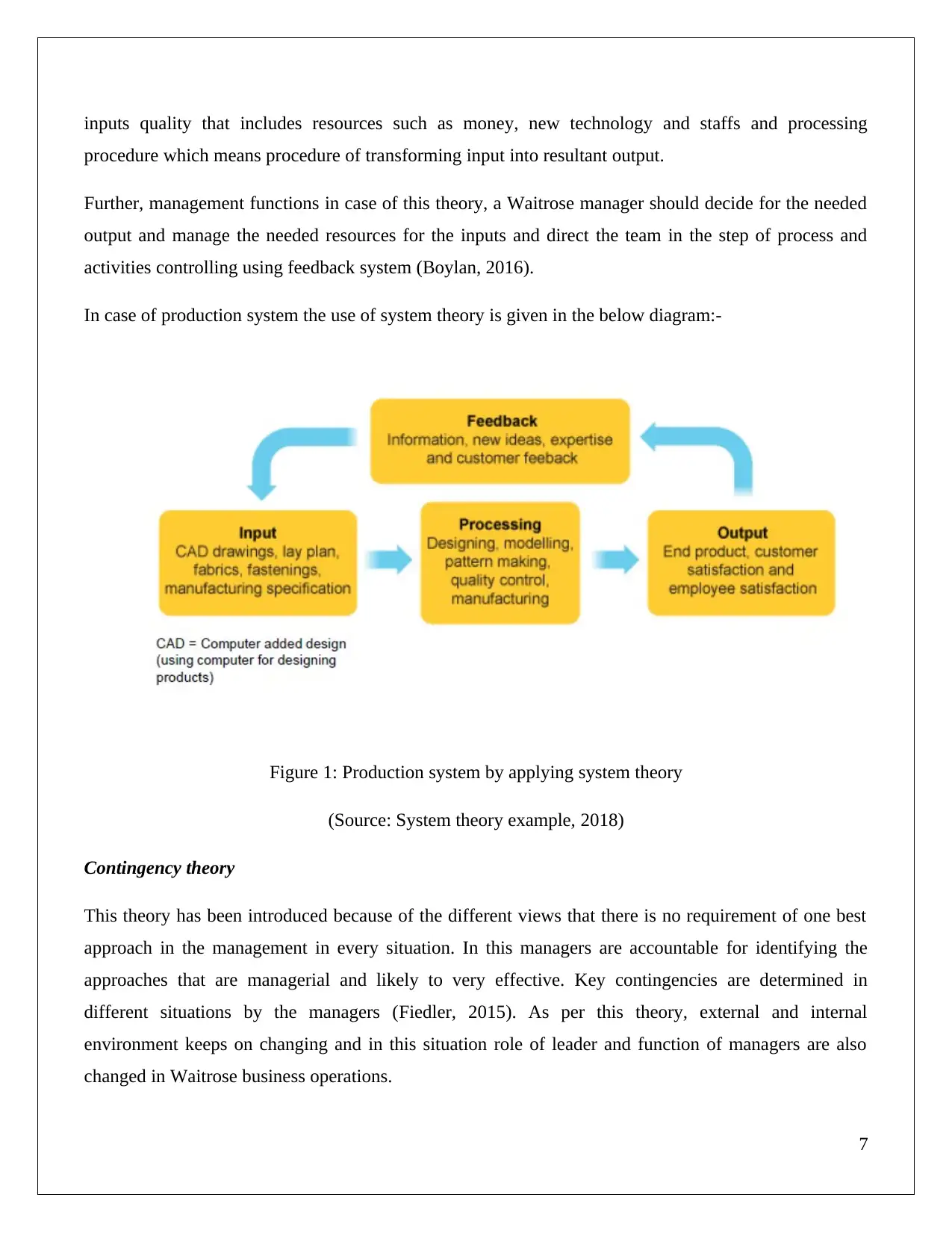
inputs quality that includes resources such as money, new technology and staffs and processing
procedure which means procedure of transforming input into resultant output.
Further, management functions in case of this theory, a Waitrose manager should decide for the needed
output and manage the needed resources for the inputs and direct the team in the step of process and
activities controlling using feedback system (Boylan, 2016).
In case of production system the use of system theory is given in the below diagram:-
Figure 1: Production system by applying system theory
(Source: System theory example, 2018)
Contingency theory
This theory has been introduced because of the different views that there is no requirement of one best
approach in the management in every situation. In this managers are accountable for identifying the
approaches that are managerial and likely to very effective. Key contingencies are determined in
different situations by the managers (Fiedler, 2015). As per this theory, external and internal
environment keeps on changing and in this situation role of leader and function of managers are also
changed in Waitrose business operations.
7
procedure which means procedure of transforming input into resultant output.
Further, management functions in case of this theory, a Waitrose manager should decide for the needed
output and manage the needed resources for the inputs and direct the team in the step of process and
activities controlling using feedback system (Boylan, 2016).
In case of production system the use of system theory is given in the below diagram:-
Figure 1: Production system by applying system theory
(Source: System theory example, 2018)
Contingency theory
This theory has been introduced because of the different views that there is no requirement of one best
approach in the management in every situation. In this managers are accountable for identifying the
approaches that are managerial and likely to very effective. Key contingencies are determined in
different situations by the managers (Fiedler, 2015). As per this theory, external and internal
environment keeps on changing and in this situation role of leader and function of managers are also
changed in Waitrose business operations.
7
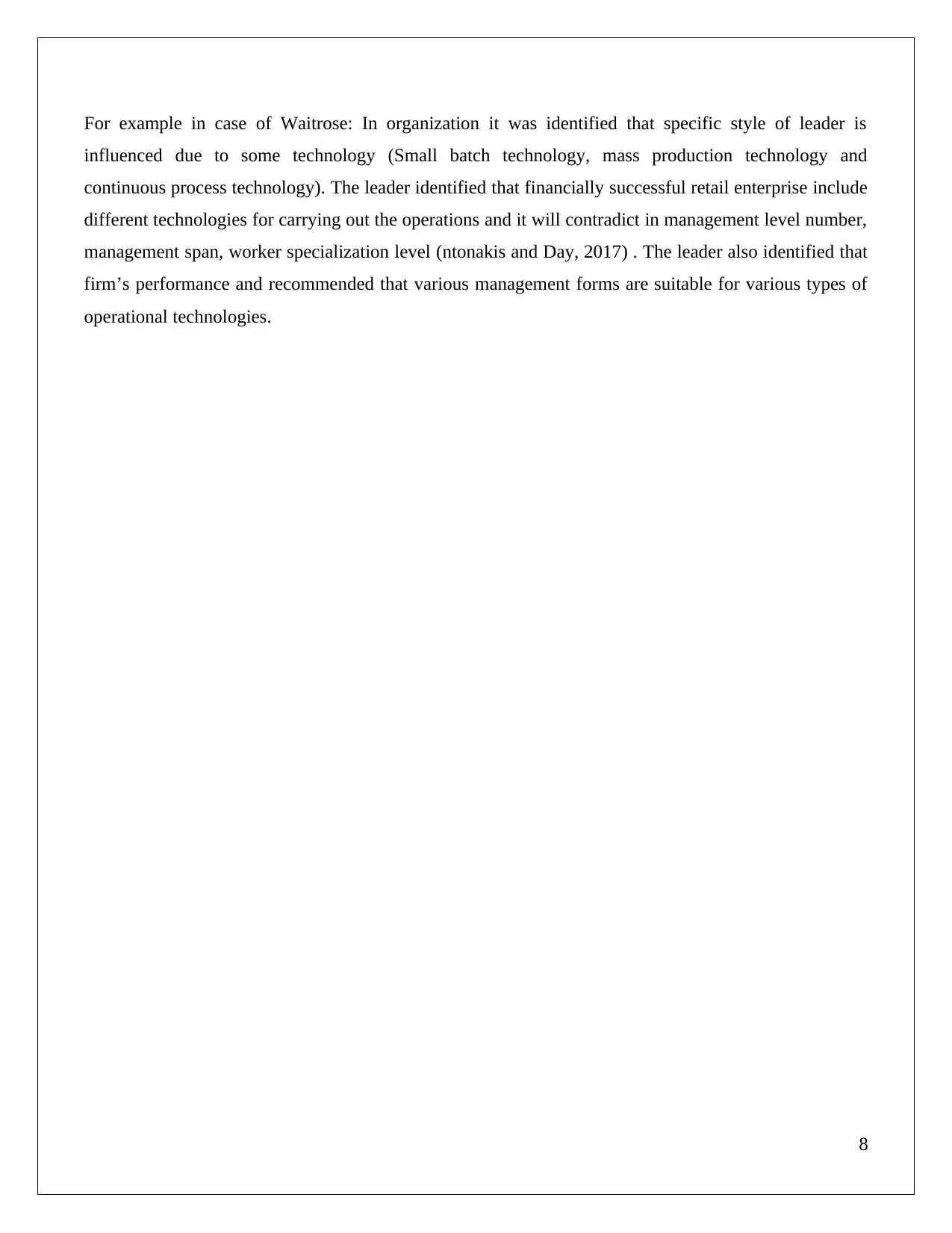
For example in case of Waitrose: In organization it was identified that specific style of leader is
influenced due to some technology (Small batch technology, mass production technology and
continuous process technology). The leader identified that financially successful retail enterprise include
different technologies for carrying out the operations and it will contradict in management level number,
management span, worker specialization level (ntonakis and Day, 2017) . The leader also identified that
firm’s performance and recommended that various management forms are suitable for various types of
operational technologies.
8
influenced due to some technology (Small batch technology, mass production technology and
continuous process technology). The leader identified that financially successful retail enterprise include
different technologies for carrying out the operations and it will contradict in management level number,
management span, worker specialization level (ntonakis and Day, 2017) . The leader also identified that
firm’s performance and recommended that various management forms are suitable for various types of
operational technologies.
8
⊘ This is a preview!⊘
Do you want full access?
Subscribe today to unlock all pages.

Trusted by 1+ million students worldwide
1 out of 21
Related Documents
Your All-in-One AI-Powered Toolkit for Academic Success.
+13062052269
info@desklib.com
Available 24*7 on WhatsApp / Email
![[object Object]](/_next/static/media/star-bottom.7253800d.svg)
Unlock your academic potential
Copyright © 2020–2026 A2Z Services. All Rights Reserved. Developed and managed by ZUCOL.



